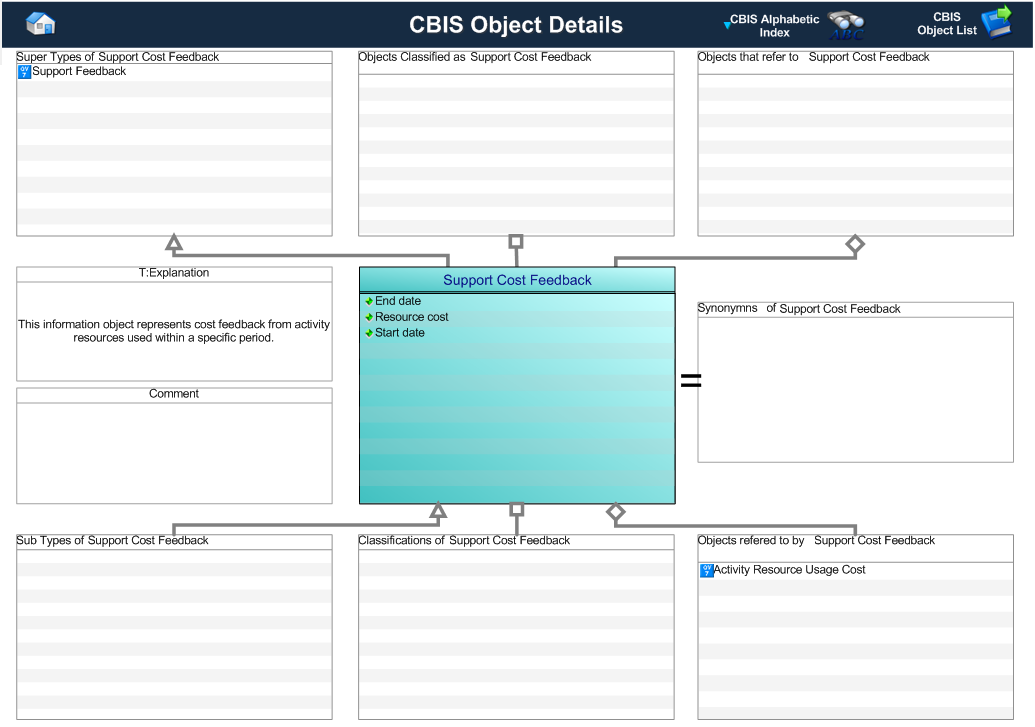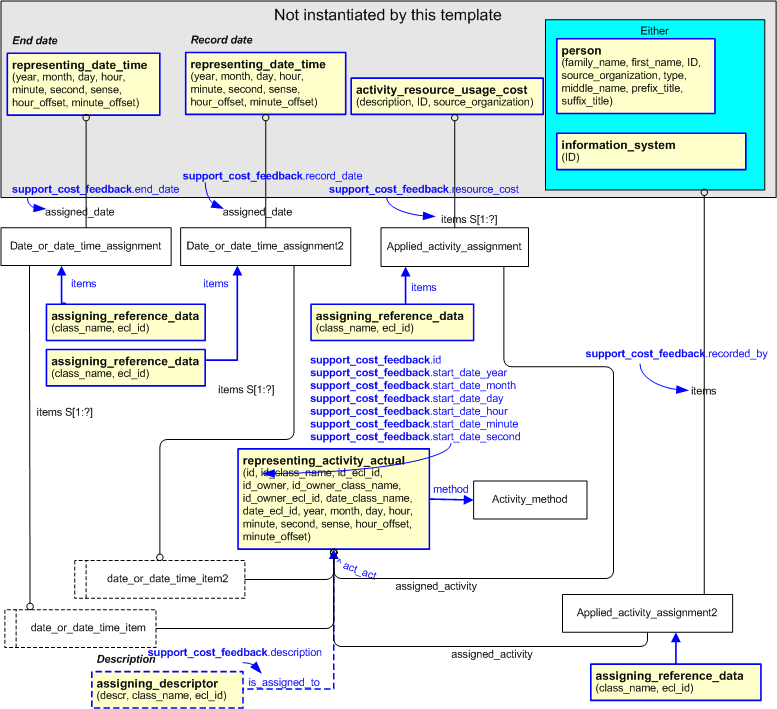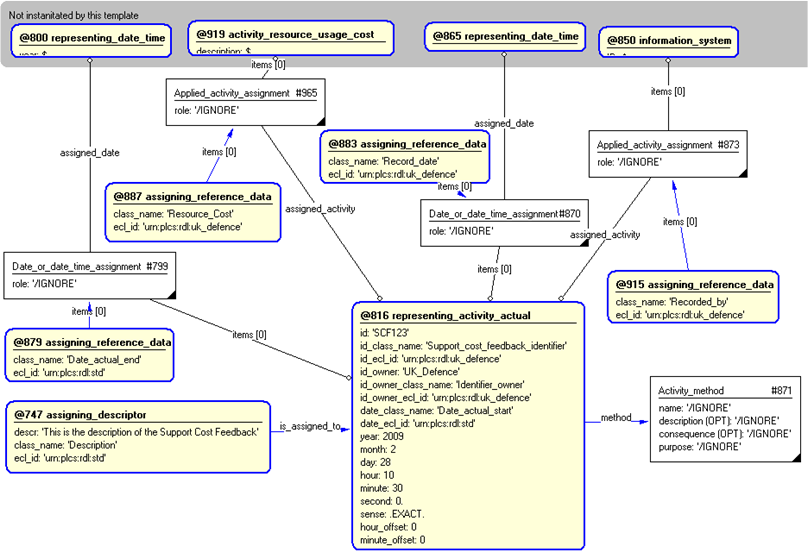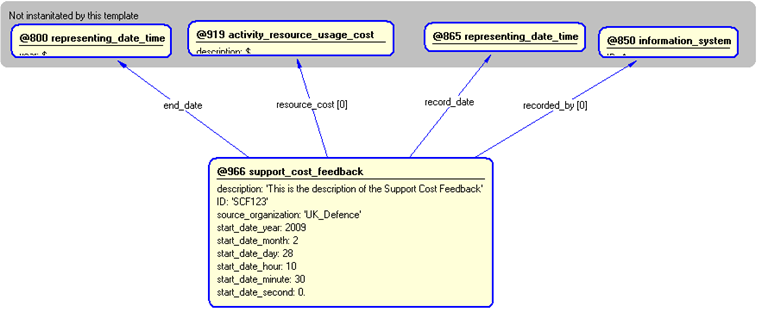Template:— support_cost_feedback (sup_ct_fbk)
Context:— UK_Defence |
Date: 2009/04/17 11:58:03
Revision: 1.2
|
This section specifies the template support_cost_feedback.
NOTE
The template has been defined in the context of
UK_Defence.
Refer to the business context for details of related templates.
NOTE
An explanation of a template and the associated instantiation path is
provided in the
Template overview
section.
This template describes how to represent cost feedback from activity resource used within a specific
period.
The support cost feedback business object is used by those UK_Defence Data Exchange
Specifications that require information about the feedback from an actual activity that is performed
on specific dates.
Figure 1 — Graphical Representation for Business Object Activity Feedback
Support Cost Feedback:
The definition of a Support Cost Feedback object is:
Data about the identification of the cost feedback from activity resource used within a specific
period.
|
Attribute name
|
Attribute description
|
Attribute type
|
Optionality
|
| End date |
This is the end date of the period for which the feedback is being reported. |
Intrinsic |
Mandatory |
| Resource cost |
This is a reference to the activity resource usage costs included in the feedback report. |
Relationship to Activity Resource Usage Cost |
Mandatory [1:?] |
| Start date |
This is the start date of the period for which the feedback is being reported. |
Intrinsic |
Mandatory |
Table 1 — Support Cost Feedback attribute details
The EXPRESS-G diagram in
Figure
2
shows the templates and EXPRESS entities that are required
to represent the template
"support_cost_feedback".
The text highlighted in blue shows the template parameters.
Figure 2 — An EXPRESS-G representation of the Information model for support_cost_feedback
The graphic for the template to be used in other EXPRESS-G diagrams
is shown in Figure
3
below.
Figure 3 — The graphical representation of the support_cost_feedback template
The following input parameters are defined for this template:
This is a description of the Product usage.
This is the end date of the period for which the feedback is being reported.
This is a reference to the activity resource usage costs included in the feedback report.
This is the identifier of the product usage report.
The organization that created the identifier. Additionally
a Person or Information System could be defined when either of these are the source; see Identifier template.
The year component of the start date and time of the period for which the feedback is being reported.
The month component of the start date and time of the period for which the feedback is being reported.
The day component of the start date and time of the period for which the feedback is being reported.
The hour component of the start date and time of the period for which the feedback is being reported.
The minute component of the start date and time of the period for which the feedback is being reported.
This parameter is optional. If not given, it will remain unset.
The second component of the start date and time of the period for which the feedback is being reported.
This parameter is optional. If not given, it will remain unset.
This is the date and time on which the support feedback record was made.
This is the reference to the person or system which recorded the feedback
The following reference parameters are defined for this template:
Allow the
Activity_actual
entity instantiated in this path to be referenced when this template is used.
%^target = $support_cost_feedback.sup_ct_fbk%
The following parameter combinations specify a uniqueness constraint:
Unique constraint: Support Cost Feedback Parameter
Each instance of the
entity
(
Activity_actual)
within the data set shall be uniquely identified
by a combination of the following parameters on this
template (support_cost_feedback) namely:
ID,
recorded_by.
The
instance is
referenced by the following template parameter:
sup_ct_fbk.
The instantiation path shown below specifies the entities that are to be
instantiated by the template.
A description of templates and the syntax for the instantiation path is
provided in the
Templates Help/Information section.
Activity_methodActivity_method.name = '/IGNORE'
Activity_method.description = '/IGNORE'
Activity_method.consequence = '/IGNORE'
Activity_method.purpose = '/IGNORE'
%^act_method =
Activity_method%
/
representing_activity_actual(
id=@ID,
id_class_name='Support_cost_feedback_identifier',
id_ecl_id='urn:plcs:rdl:uk_defence',
id_owner=@source_organization,
id_owner_class_name='Identifier_owner',
id_owner_ecl_id='urn:plcs:rdl:uk_defence, date_class_name=')/
%^sup_ct_fbk = $representing_activity_actual.act_act%
-- [Optional Description] /
assigning_descriptor(
descr=@description,
class_name='Description',
ecl_id='urn:plcs:rdl:uk_defence',
is_assigned_to=^sup_ct_fbk)/
-- relationship to activity resource usage cost Applied_activity_assignmentApplied_activity_assignment.role = '/IGNORE'
Applied_activity_assignment.items ->
@resource_costApplied_activity_assignment.assigned_activity ->
^sup_ct_fbk
%^res_cost =
Applied_activity_assignment%
/
assigning_reference_data(
items=^res_cost,
class_name='Resource_cost',
ecl_id='urn:plcs:rdl:uk_defence')/
-- relationship to end time Date_or_date_time_assignmentDate_or_date_time_assignment.role = '/IGNORE'
Date_or_date_time_assignment.items ->
^sup_ct_fbk
Date_or_date_time_assignment.assigned_date ->
@end_date%^end_date_time =
Date_or_date_time_assignment%
/
assigning_reference_data(
items=^end_date_time,
class_name='Date_actual_end',
ecl_id='urn:plcs:rdl:std')/
-- relationship to record_date Date_or_date_time_assignmentDate_or_date_time_assignment.role = '/IGNORE'
Date_or_date_time_assignment.items ->
^sup_ct_fbk
Date_or_date_time_assignment.assigned_date ->
@record_date%^record_date_time =
Date_or_date_time_assignment%
/
assigning_reference_data(
items=^record_date_time,
class_name='Record_date',
ecl_id='urn:plcs:rdl:uk_defence')/
-- relationship to recorded by Applied_activity_assignmentApplied_activity_assignment.role = '/IGNORE'
Applied_activity_assignment.items ->
@recorded_byApplied_activity_assignment.assigned_activity ->
^sup_ct_fbk
%^rec_by =
Applied_activity_assignment%
/
assigning_reference_data(
items=^rec_by,
class_name='Recorded_by',
ecl_id='urn:plcs:rdl:uk_defence')/
The following entities are instantiated with attributes as specified:
The instance diagram in Figure
4
shows an example of the EXPRESS entities and templates that are instantiated by the template:
/support_cost_feedback(description='This is the description of the Support Cost Feedback', end_date='@800', resource_cost='@919', ID='SCF123', source_organization='UK_Defence', start_date_year='2009', start_date_month='2', start_date_day='28', start_date_hour='10', start_date_minute='30', start_date_second='0', record_date='@865', recorded_by='@850')/
(an illustration of the consolidated support_cost_feedback template is shown in
Figure
5 below.)
Figure 4 — Entities instantiated by support_cost_feedback template
The instance diagram in
Figure
5
shows the graphic symbol for the template that is to be
used in other instance diagrams. The example template is:
/support_cost_feedback(description='This is the description of the Support Cost Feedback', end_date='@800', resource_cost='@919', ID='SCF123', source_organization='UK_Defence', start_date_year='2009', start_date_month='2', start_date_day='28', start_date_hour='10', start_date_minute='30', start_date_second='0', record_date='@865', recorded_by='@850')/
Figure 5 — Instantiation of support_cost_feedback template
Characterizations
No common characterizations of the template
support_cost_feedback
have been identified. However, the ISO 10303-239 EXPRESS model
may enable other assignments to the entities instantiated by the template.




